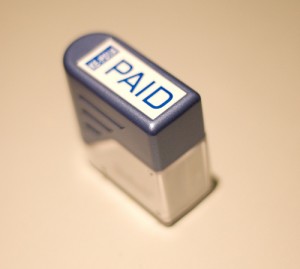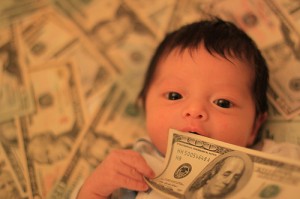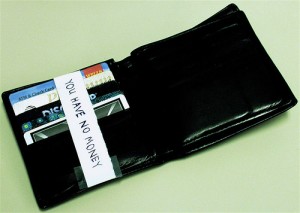This post was originally published on June 8, 2010.
 Paycheck-to-paycheck living has become all too common, especially in this economic climate. Unfortunately, it’s a vicious cycle, and when you’re in the middle of it, it can feel impossible to break out of it. It seems that every time you start to get ahead, there’s a car problem or a medical emergency or some other sudden expense that lands you right back where you started. I know from personal experience.
Paycheck-to-paycheck living has become all too common, especially in this economic climate. Unfortunately, it’s a vicious cycle, and when you’re in the middle of it, it can feel impossible to break out of it. It seems that every time you start to get ahead, there’s a car problem or a medical emergency or some other sudden expense that lands you right back where you started. I know from personal experience.
Nothing reminds you of how unsustainable paycheck-to-paycheck living is like losing your income. My husband and I supplemented a low income with our savings account for 8 months in 2010, and I can’t help but think about how different our situation would be if we hadn’t broken free of the paycheck-to-paycheck cycle.
The good news is, it’s not impossible to break the cycle. It takes time and patience and perseverance, but you can dig yourself out of the rut of paycheck-to-paycheck living. Here’s how:
Stop blaming your income.
One of the biggest complaints of people living paycheck-to-paycheck is that they simply don’t make enough money. It’s easy to tell yourself that your income is the problem, and that making more money is the answer. The problem with that line of thinking is that lifestyle inflation usually goes hand-in-hand with income increases when you’re living paycheck-to-paycheck. The sad truth is that it doesn’t matter what you make; you will find a way to spend it all. So stop blaming your income, and start thinking of ways to fix your situation now.
I know there are people who legitimately struggle with low income. If you’re in that situation, and you’re taking advantage of all of the government programs available to help you get back on your feet and still struggling, the only advice I can give you is do what you can to survive for now. It won’t last forever. But someday when you’re earning more, remember this time. It will motivate you to save a cushion that will protect you from going through this again.
Spend less than you make.
If you’re stuck in a paycheck-to-paycheck rut, the only way to start digging your way out is to start spending less than you make. The very first step is to build a budget and cut any and all unnecessary expenses. If you’re ever going to get ahead, you need to free up some money in your budget to give yourself a cushion. Take a serious look at your spending habits. If you’re struggling to make ends meet, it’s likely that you’re overspending.
If you’ve taken a serious look at your finances, and you continue to struggle despite the fact that you’re not eating out or making unnecessary purchases, it’s possible you fall into an income category that could qualify you for government assistance. Consider taking advantage of those programs to help you dig your way out of your rut.
Save for emergencies.
If you’re living paycheck-to-paycheck, this scenario is probably familiar: every month, you try to put money in the bank, and every month something comes up that forces you to clear out your savings account. Before you can truly break the cycle, you need to be prepared for emergencies. Once you’ve cut your spending, start putting every extra cent into savings. Don’t be discouraged if you hit a few setbacks. Just keep saving. Eventually, you’ll build a cushion of $1,000-$2,000 for financial emergencies.
Pay this month’s bills with last month’s paycheck.
The ultimate goal is to get ahead of your expenses. Once you’ve saved for emergencies, it’s time to build a cushion on your checking account. If you’ve built a budget, then you should know approximately how much you spend each month. Instead of spending extra money, put it aside to put yourself ahead. Once you’ve saved an entire month’s worth of expenses, you’ll no longer be waiting until payday to send a check or restock the refrigerator.
Be disciplined.
When you’ve got several thousand dollars in the bank, it can be hard not to feel so confident in your finances that you go right back to your overspending ways. Remember, though, your savings doesn’t change your income. What I mean is, if your paychecks equal $3,000 a month, and you have $5,000 in the bank, it may feel like you can spend $3,500 a month. But remember, your savings won’t last forever, and you’ll end up right back where you started in four months. Budget according to your monthly income. If an emergency forces you to tap your emergency savings, be diligent about replenishing what you spent. Otherwise, you’ll end up living paycheck-to-paycheck again.






